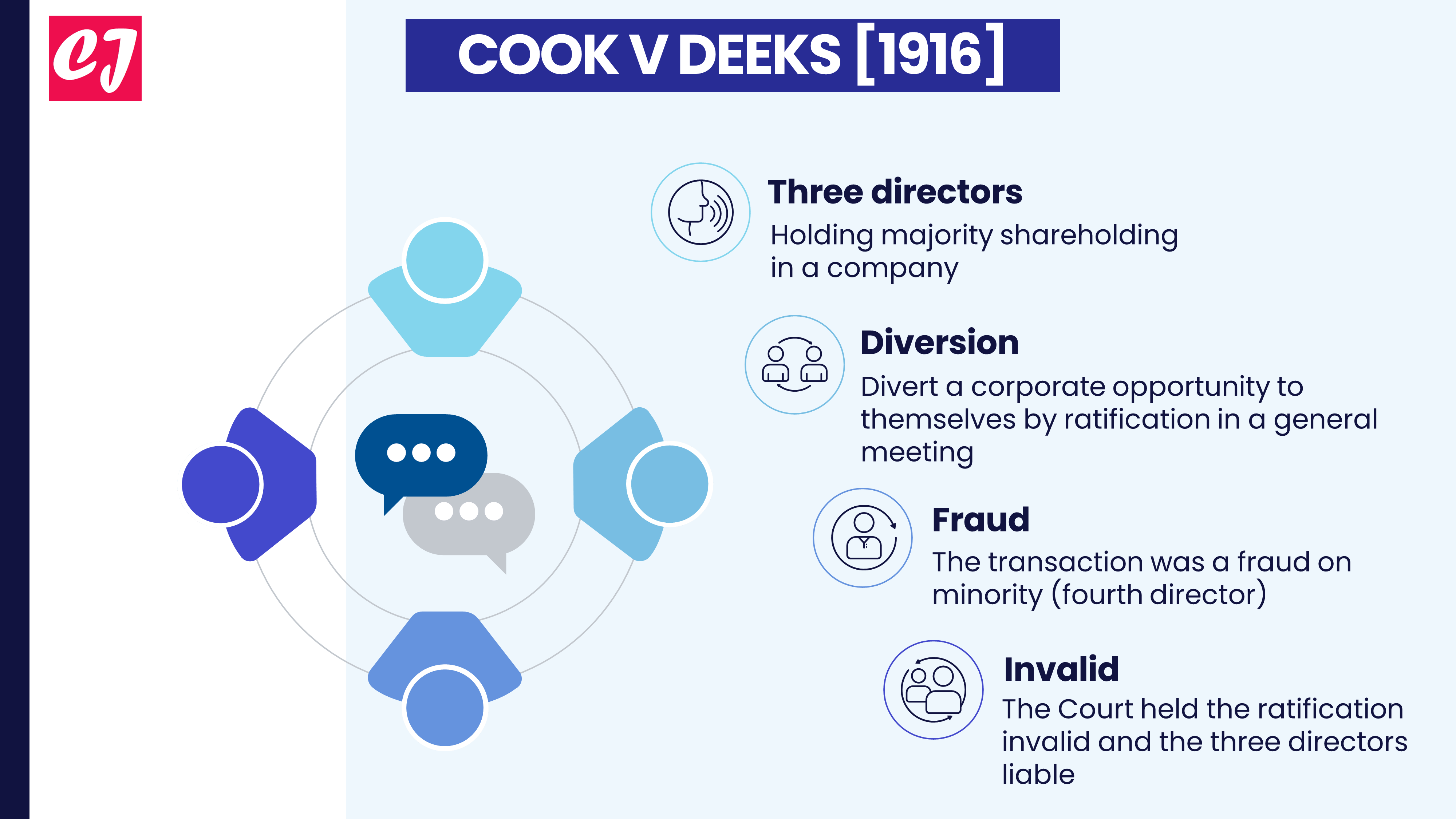
A Case Summary of Cook v Deeks [1916]
Cook v Deeks [1916] is a Canadian case that raised ethical and legal concerns over the actions taken by directors in a company.
Case name & citation: A. B. Cook v George S. Deeks and others [1916] 1 AC 554; [1916] UKPC 10
- The concerned Court: Judicial Committee of the Privy Council
- Decided on: 23 February 1916
- Area of law: Duties of directors; Corporate opportunity
What happened in Cook v Deeks?
Given below is a summary of the case in points.
1. Formation of new company
There were four directors each holding a 25% share in Toronto Construction Co. Three of them wanted to part ways with the fourth director. The three directors made arrangements in their own name to procure a lucrative contract with Canadian Pacific Railway Company that was similar to the ones previously executed by the jointly owned company. They then formed a new company to divert this opportunity and carry out the contract.
2. Ratification
The three directors, by using their majority votes in a general meeting, passed a resolution to approve the sale of part of the assets belonging to their jointly owned company to the newly formed company. In addition, they also obtained a declaration that the jointly owned company had no interest in the contract procured by the directors.
3. Claim
The fourth director (i.e., the minority shareholder) claimed that the ratification was invalid and that the contract belonged to Toronto Construction Co.
4. Duties of directors
The three directors were found to have breached their fiduciary duties to the original company. Through the exercise of their controlling power, they procured the ratification at the general meeting of their breach of duty. They diverted to themselves property transactions and assets of the company.
5. Lack of transparency
Hence, it was noticed that there was a lack of honesty and transparency both in the transaction as well as the subsequent process of ratification.
6. Invalidation
The directors had misused their voting powers. The contract should have belonged to the company. Effectively, they misappropriated a business opportunity that was available to the company.
The Privy Council declared the ratification invalid and held that the three directors were liable as constructive trustees of the company for the profits they had improperly gained through these actions. They were liable to surrender the profits to the company.
7. Fraud
The misappropriation was considered a fraud on the minority.
8. Key Takeaway
The above case of Cook v Deeks suggests a fair view. To authorize a director to take a corporate opportunity, it must only be the disinterested shareholders who must take the decision. The director who is seeking authorization must not be allowed to vote his or her own shares in this context.
Quotes from the case
Lord Buckmaster said as under:
“The three directors had deliberately designed to exclude and used their influence and position to exclude, the company whose interest it was their first duty to protect.
It appears quite certain that directors holding a majority of votes would not be permitted to make a present to themselves. This would be to allow a majority to oppress the minority …. If the directors have acquired for themselves property or rights which they must be regarded as holding on behalf of the company, a resolution that the rights of the company should be disregarded in the matter would amount to forfeiting the interest and property of the minority of shareholders in favour of the majority, and that by the votes of those who are interested in securing the property for themselves. Such use of voting power has never been sanctioned by the Courts.”
List of references:
- https://virtusinterpress.org/IMG/pdf/10-22495_cbv10i2art3.pdf
- https://static1.squarespace.com/static/5d7a20e036b3e97358551d93/t/5fac55dc9a1aef48f6f29a85/1605129700138/PGDL+Core+Guide+Sample.pdf
- https://researchoutput.csu.edu.au/ws/portalfiles/portal/88607601/88582860_Published_article.pdf
- https://ca.practicallaw.thomsonreuters.com/7-523-7348?transitionType=Default&contextData=(sc.Default)&firstPage=true
You might also like:
More from corporate law:

